Content Sections
By Rob Verkerk PhD, founder, executive and scientific director, ANH-Intl
How would you like to turn back your biological clock a few years – or even a decade or more? I don’t just mean so you might look better on the outside, as that can, after all, be just cosmetic.
I’m talking here about the genuine reversal of ageing that affects the inside of your body as well, from your brain to your big toes. Reducing the risk of degenerative diseases like Alzheimer’s, heart disease and cancer. Feeling like you’re bounding with energy as you might have been years or even decades ago. In fact, reversing ageing so comprehensively that you can confirm your clock-reversing feat via one of the most robust markers of ageing and disease risk – your telomere length. For those who aren’t familiar, telomeres are the caps made up of repetitive nucleotide sequences at the ends of chromosomes that play a key role in complete chromosome replication and their length is a strong predictor of potential life span.
Is this just science fiction, or is it something we’re still waiting to hear about from some Californian biotech spin-off that Aubrey de Grey may have been linked to?
As it happens, neither is the case. It can be done, and it is being done by those in the know. Sadly, what many of us who’ve been studying this area for some time might regard as the most powerful approach to biological age reversal currently known on the planet, is barely known outside limited groups of anti-ageing specialists. The approach works directly against Big Pharma’s model that benefits from a world awash with lots of sick people who take its drugs on the recommendation of doctors who consider they have, courtesy of their education and licensing boards, few other options. Remarkably, the scientific achievements in the form of biological age reversal I’m talking about have happened without any support from the biggest economic powerhouse in research and media dissemination in the world – Big Pharma itself.
So it was fascinating to be invited to speak last weekend at the Profound Health Summit at the Luton Hoo (UK) and meet with and learn more about the incredible progress that’s been made over the last 45 years by Prof Vladimir Khavinson and his team at the Institute of Bioregulation and Gerontology, St Peterburg, Russia. It was both an honour and a privilege to be asked to speak at the Summit on the same stage, in my case mapping the global regulatory threats and opportunities for different classes of health product, including peptide regulators.

Prof Vladimir speaking at the Profound Health Summit
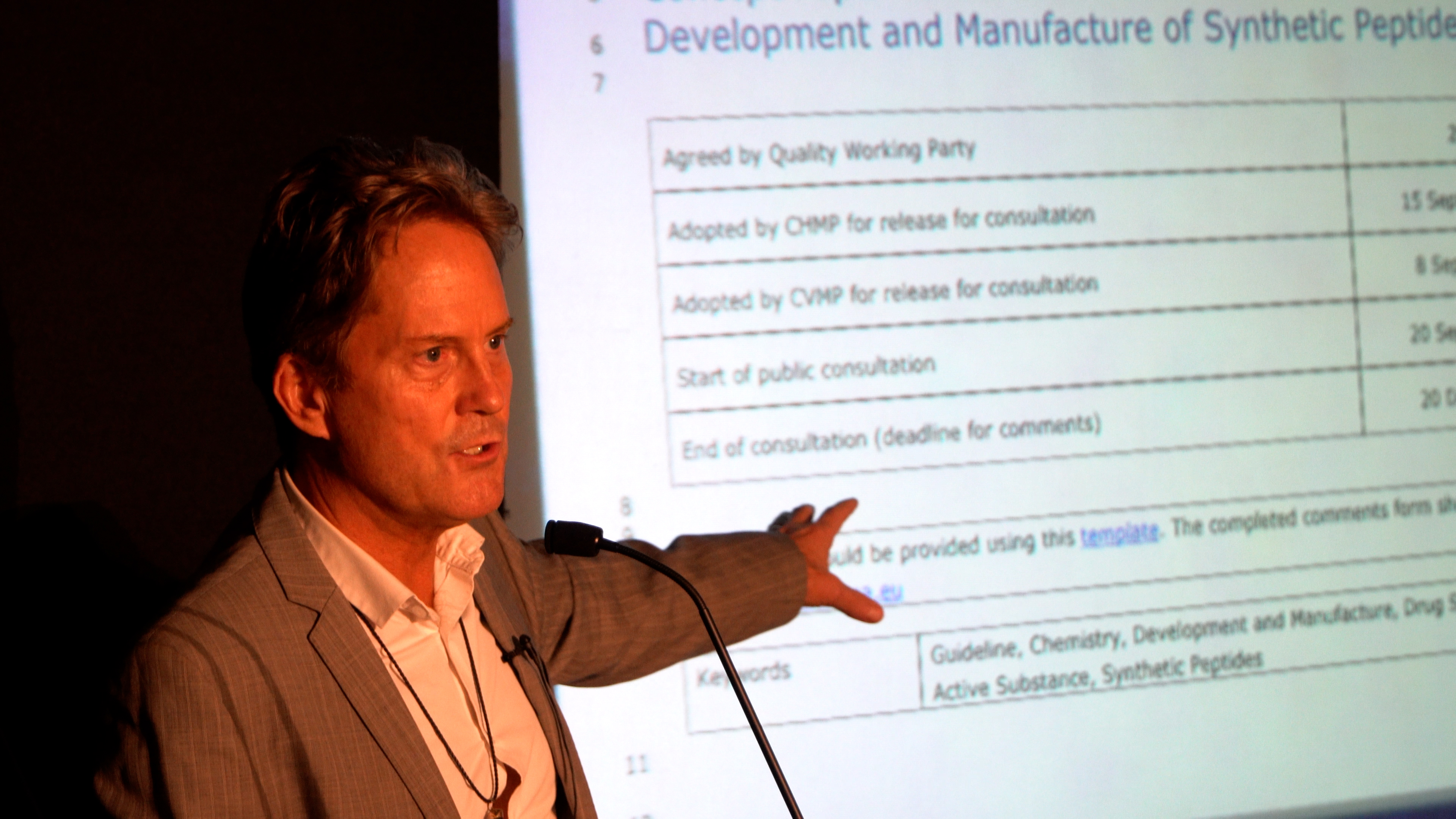
Rob Verkerk PhD speaking at the Profound Health Summit
Vladimir Khavinson and the key role of peptide bioregulators
Prof Khavinson’s credentials are impressive and include the publication of over 700 peer reviewed papers. His curriculum vitae can be found here.
At the heart of his approach is the recognition that some of the most powerful bioregulators within humans (and other animals) are very small molecules comprised of a small number of bonded amino acids, referred to as small or short peptides.
This remarkable and important finding emerged from research carried out over 50 years ago in the Soviet Union, when Vladimir Khavinson was only in his 20s, that was heavily funded by the Soviet government. One of the main goals of the research was to find ways of overcoming eye and ear injuries suffered by military personnel, and the starting point of the research was apparently some of the original work by Ivan Pavlov on regulatory peptides. Pavlov is of course better known for his work on dogs, digestion and the conditioned response for which he was awarded a Nobel Prize.
While the bioregulatory role of small peptides has been known for over 100 years, there have been ongoing discoveries on their significance, including more recently the work of Aaron Ciechanover, Avram Hershko and Irwin Rose who were awarded the Nobel Prize in Chemistry in 2004 for their discovery that the polypeptide ubiquitin was critical to the cell cycle, with ubiquitin-marked cells being consigned to cellular ‘waste bins’ (proteasomes).
But it was Vladimir Khavinson’s work that exposed the even more critical role of small peptides, in protein biosynthesis and gene expression. And a Nobel Prize, disappointingly, has yet to be awarded.
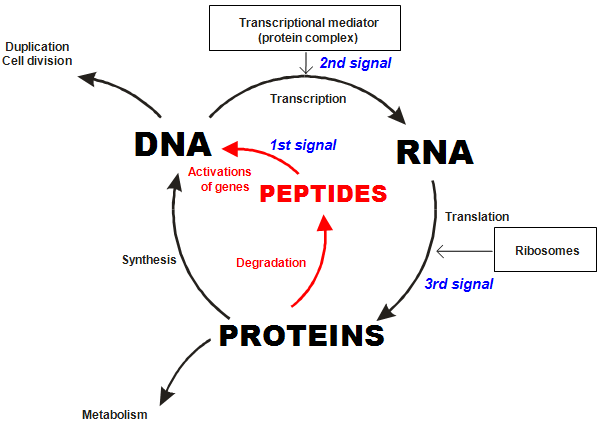
Figure 1. The critical role of peptides in the cycle of DNA, RNA and protein biosynthesis (Source: Khavinson V. Kh. Peptidergic Regulation of Ageing. 2009. Read online).
What Khavinson’s research team found was that these small peptides are able to bind between prised-open DNA strands that are freed from histones prior to transcription (Fig. 2), leading to the control of gene expression and protein biosynthesis.
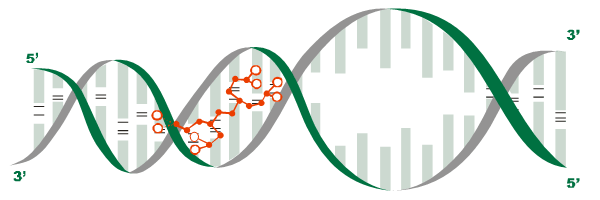
Figure 2. Schematic showing local separation of strands through the partial destruction of hydrogen bonds between the nucleotides of the DNA double helix as a result of peptide (Ala-Glu-Asp-Gly) binding (Source: Khavinson V. Kh. Peptidergic Regulation of Ageing. 2009. Read online).
The work of Prof Khavinson’s group over the last 45 years spans everything from theoretical work to cell culture studies, animal experiments, clinical trials, and the development of medical centres and clinics that specialise in providing treatments with peptide bioregulators (as injectables, oral supplements and cosmeceuticals).
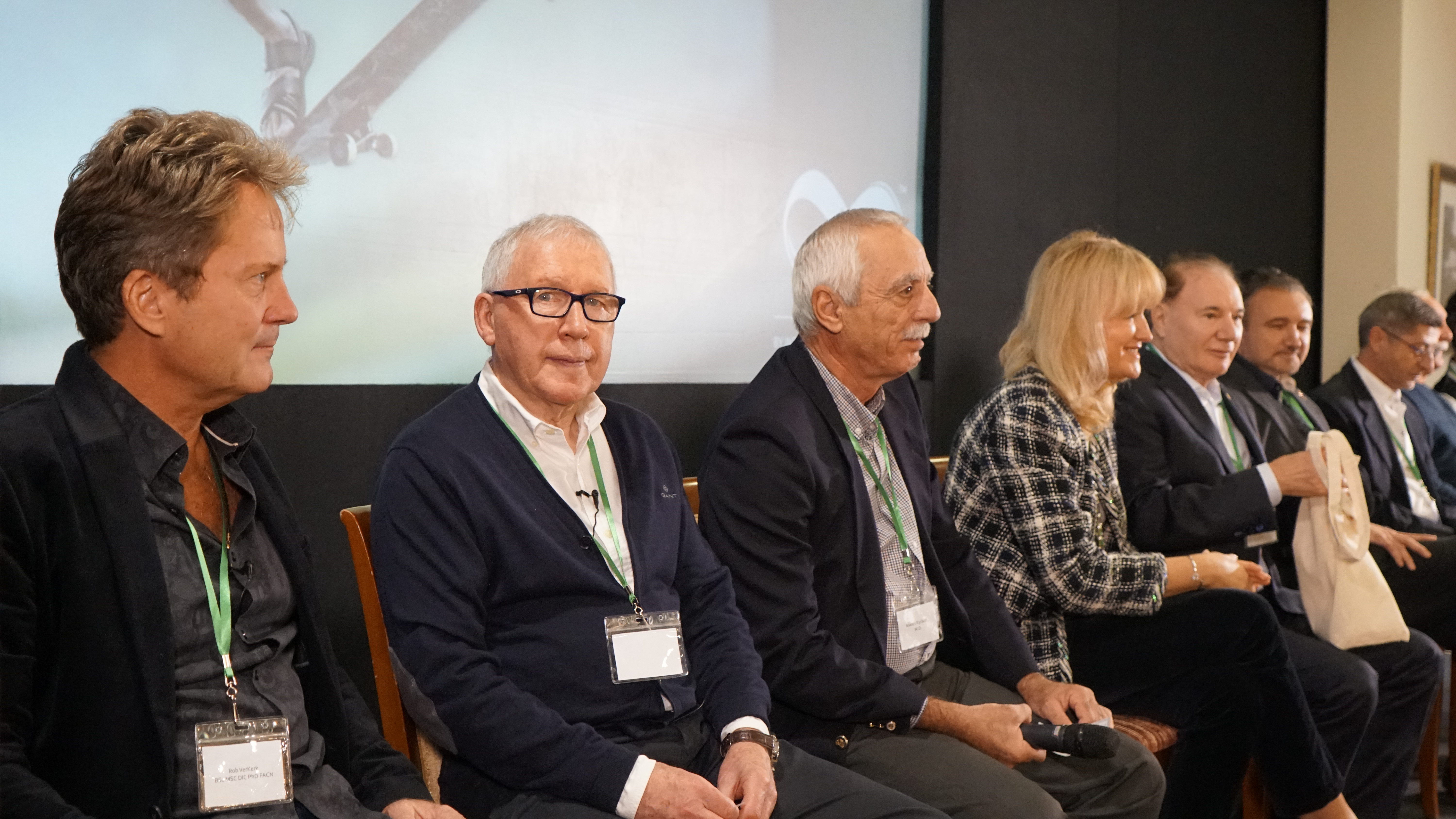
Speakers (visible from left to right: Rob Verkerk PhD, Dr Dorian Dugmore, Dr Marios Kyriazis, Dr Svetlana Trofimova, Prof Vladimir Khavinson, Dr Nyjon Eccles, Dr Valerio di Nicola) answering questions in a Q&A session
The work that has led to commercialisation of peptide bioregulators started in earnest in the late 1970s with the investigation of responses in mice following administration of peptide preparations isolated from thymus and pineal glands, the thymus being the source of peptides first found to reverse age-related declines in immune responses during the mid-1970s.
The work has culminated in showing that peptide bioregulators play a key role in preserving the normal, homeostatic function of younger, healthy humans and other animals, and that the decline of these functions with age is strongly linked to declining production of these small bioregulatory peptides within the body and this is, in turn, strongly linked to premature ageing and age-associated pathology.
In terms of the application of this knowledge, it has also been shown that administering specific peptide bioregulators to humans and animals can not only halt the age-related deterioration of multiple functions, it can even reverse them with clear evidence that healthy lifespan can be increased accordingly.
>>> To read more about the extraordinary scientific discoveries around peptide bioregulators, click here and here.
>>> View Prof Khavinson’s PowerPoint ‘Peptides, Genome, Ageing’ here.
Khavinson peptides enter clinical studies in the USA
As far as I am aware, there is not a single other top level researcher and associated research group which has made major contributions to basic science, in this case discovering the fundamental role of small peptides in bioregulation and gene expression, that have gone on to develop a suite of products and protocols that both treat and prevent almost every common degenerative disease.
Not only that, the emerging evidence from thousands of people already treated, some of which are currently participants in trials, is that treatment using food supplements for healthy populations enables them to extend their lives significantly and maintain good health at the same time.
Prof Khavinson recognises the extreme importance of getting this knowledge outside Russia. And it’s for this reason he has been collaborating with Dr Bill Lawrence, a lawyer, turned entrepreneur, turned longevity researcher and expert who has been administrator for two major clinical trials on peptides in the USA.
I was fortunate enough to meet Bill this weekend and those of us present were privy to some of the remarkable interim results, including how the peptides are reversing biological age, as measured by Dr Steve Horvath’s epigenetic clock based on DNA methylation (DNAm).
You can learn more about Dr Bill Lawrence’s collaboration with Prof Khavinson in this 2021 interview with nutritionist Nat Niddam, below.
You can also listen to Nat Niddham’s two podcasts (May and June 2021, respectively) with Bill Lawrence, as follows:
- Part 1, Bioregulator Peptides: Increase Health Span, Lengthen Telomeres & Turn Back the Clock with Dr Bill Lawrence, PhD; and
- Part 2, Reversing Aging PART 2 Bioregulator Peptides Effect on DNA Methylation Clinical Trial.
Another recent interview (December 2021) with Bill Lawrence was conducted by Zora Benhamou and is available as a podcast.
Commercialisation
Presently, there are over 21 commercial products available, as injectable pharmaceuticals, food supplements and cosmeceuticals. Some are manufactured in Russia, others in Denmark, Italy and France.
For many people, the food supplement forms will be of greatest benefit – and interim results from the clinical trials that are underway, one of which is some 5 years in, the other some 3 years in, under the administration of Bill Lawrence, are showing they have immense power not only in halting biological age, but also reversing it.
Peptide extracts that have been found to contribute to functional correction to specific systems are listed below:
|
Peptide extract organ/tissue (bovine) |
Site of primary activity |
|
Brain extract |
Correction of brain and central nervous system functions |
|
Thymus gland extract |
Correction of immune system functions |
|
Pineal gland extract |
Correction of endocrine system functions |
|
Vessels extract |
Correction of cardiovascular system functions |
|
Pancreas extract |
Correction of pancreatic function |
|
Cartilage extract |
Correction of function of joints and spine |
|
Liver extract |
Correction of liver and digestive system functions |
|
Liver extract |
Correction or urogenital system functions |
|
Retinal extract |
Correction of visual functions |
|
Adrenal extract |
Correction of adrenal function and improvement in stress response |
|
Muscle extract |
|
Information gathered from Peptide Bioregulator Report (2007), www.gerontology.ru/cytomaxs website, and UK Antiaging Peptides website
The full range of commercially-available natural peptide bioregulators (including synthetic versions for vegetarians and vegans) can be found at the Institute of Bioregulators and Gerontology website.
End Note
For my part, I was honoured be invited by Phil Micans, director of Profound Health, to the conference. It was an extraordinary privilege to share some meaningful time, as well as the speakers’ stage, with Profs Khavinson and Svetlana Trofimova, the latter being responsible for the clinical work at the medical centre at the St Petersburg institute.
Having heard Aubrey de Grey say more than once that science had yet to turn up any product that could successfully reverse ageing, I was pleased to find myself sitting within 2 metres of Aubrey during Prof Khavinson’s main lecture, taking detailed notes. Aubrey was the guest speaker at the gala dinner, and it was clear he recognised the import of the findings of Prof Khavinson’s team, which clearly had not yet landed in the biotech-based world of anti-ageing research. It was also of interest to hear Dr de Grey refer to the circumstances that forced him to be removed from his founding role at the SENS Foundation as a set up.
Finally, and more personally, I would like to express my gratitude over the fact that I will soon be starting a course of peptide treatment to assist the continued repair of the inner ear injury I sustained some 2 months back. I will be happy to report on progress in due course, which I’m hoping will include the turning back of my epigenetic clock!
Find out more
Prof Vladimir Khavinson’s website
Swedish Peptide Bioregulators website
>>> Feel free to republish - just follow our Alliance for Natural Health International Re-publishing Guidelines
>>> If you’re not already signed up for our weekly newsletter, sign up for free now using the SUBSCRIBE button at the top of our website – or better still – become a Pathfinder member and enjoy benefits unique to our members.
>>> Return to the homepage





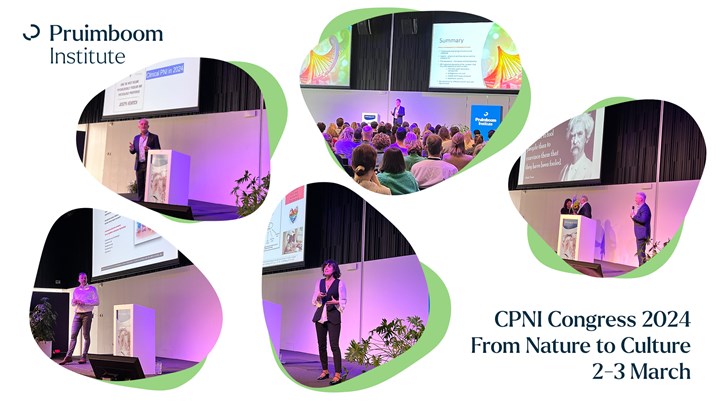
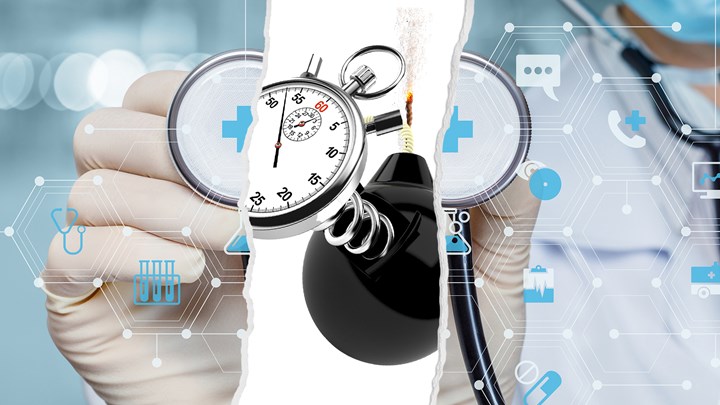

Comments
your voice counts
06 October 2022 at 9:29 am
It would be no surprise to me if the peptide actin is the active ingredient as the secret key to life . The cover article' Epigenetics Key to Love Life' on p.20 explains: https://issuu.com/naturopathymagazine/docs/digitalnaturopathy_magazine_05
06 October 2022 at 10:50 am
Thank you for a very interesting article.
You propose that short chain peptides are the best method of reversing aging. I would be interested to see a comparison with the anti-ageing effects of Transcendental Meditation - see Bullet 4 of Table 1 at https://uk.tm.org/documents/12132/17158243/TM+Research+Summary+-+Chalmers+29.8.2020/052fc842-f907-4a97-a1dc-e9e46cfab96f.
Even more interesting would be to see what effects a combination of Transcendental Meditation and peptides would have.
Warm regards
Your voice counts
We welcome your comments and are very interested in your point of view, but we ask that you keep them relevant to the article, that they be civil and without commercial links. All comments are moderated prior to being published. We reserve the right to edit or not publish comments that we consider abusive or offensive.
There is extra content here from a third party provider. You will be unable to see this content unless you agree to allow Content Cookies. Cookie Preferences